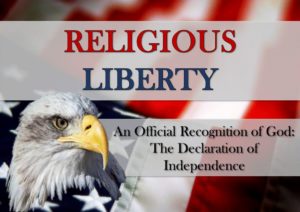 Occasionally someone will assert that because the United States Constitution does not directly mention God, He should be absent from our government. Is that, however, logical?
Occasionally someone will assert that because the United States Constitution does not directly mention God, He should be absent from our government. Is that, however, logical?
It is true that the Constitution does not directly mention God. However, using that fact as a springboard for the removal of God from our public life is quite a stretch, and it comes from a misunderstanding of the purpose of the document.
To understand the purpose of the Constitution, we need to take a look at an earlier and arguably more important document: the Declaration of Independence.
Most Americans will agree that the Declaration of Independence is one of the most beloved documents in our national history. Often called America’s “birth certificate,” it was penned primarily by Thomas Jefferson and officially recognized the self-declared freedom of the colonies from the king of England. The control that King George exerted over the New World had so exasperated the colonists that they decided that, regardless of the consequences, they would rebel against his authority.
Much of the text of the Declaration of Independence may seem unimportant to us. After all, when was the last time you lost sleep over the fear that the British monarchy might raise your taxes or deprive you of trial by jury? You probably haven’t given those possibilities a moment’s thought.
The fact that Declaration of Independence focuses on King George, however, is incidental. It did not matter who was stripping freedom from the colonists—what was important was that it was being done. The inability to live in freedom was incompatible with the philosophy of the colonists, who believed that man has a fundamental right to liberty.
Even more important was the source of this right to liberty. It was acquired not by any governmental decree or democratic vote. It was granted by God.
Those who signed the Declaration of Independence collectively declared “these truths to be self-evident, that all men are created equal, and they are endowed by their Creator with certain unalienable rights.” If the existence of rights supplied by the Creator is self-evident, then would the existence of a Creator not also be self-evident?
The men who formulated this pivotal document simply assumed there was a God and expected that their fellow Americans would agree with them. Furthermore, they thought it both acceptable and necessary to include God in the decree that sparked the American Revolution, and why not? After all, it was the fact that He created men that provided them with the right to liberty.
So, does the fact that the Constitution does not mention God mean that He has no place in our government? Absolutely not. The founding document of our nation not only recognizes Him, but declares that He is the source of our freedom. The Declaration of Independence is the document that gave birth to the new nation and declares why it was founded; the Constitution merely outlines how the nation should be governed.[i]
We are free because God created us to be so. That is the premise upon which our nation was founded. Does God have a place in our government? The answer is simple: our government exists because there is a God. No God, no America. Does it make sense then to remove Him from our government?
Previous article: Freedom to Practice Religion: Virginia and Maryland
Next article: The Integration of Christianity and American Society: The Supreme Court
See the other articles about religious liberty
[i] Gibbs and Newcombe, One Nation Under God: Ten Things Every Christian Should Know About the Founding of America, 138.



